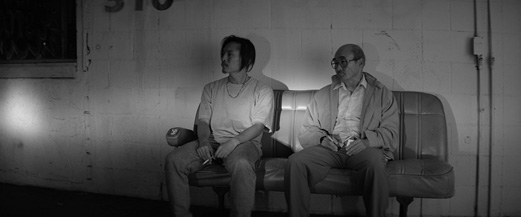Movie Review: Gook
By Matthew Huntley
September 12, 2017
BoxOfficeProphets.com

And yet, despite its familiar “independent film” characteristics, Gook stands on its own. This is not a smug carbon copy of those earlier films, although it's likely Chon drew inspiration from them, but rather a self-contained, thoughtful endeavor that gains more traction and depth as it goes along. By the end, we appreciate the filmmakers and cast's dedication to the material because they've given us something important to think about and people we believe in.
Chon plays Eli, a young Korean man, angry and short-tempered, who has inherited a ladies shoe store from his deceased father. Eli has a slightly younger brother, Daniel (David So), who's cheerful, playful and artistic. He too works at the store but takes his job less seriously than Eli. For instance, Daniel is more willing to hand out “manager's discounts” to attractive young ladies in hopes of scoring a free hook-up. Eli, on the other hand, remains grounded and cautious, cognizant of the fact they're behind on rent and very close to losing the store unless they make a lot of sales.
The store closing would not only be bad for Eli and Daniel, but also Kamilla (Simone Baker), an African-American girl just on the verge of adolescence who has befriended the Korean brothers and hangs out at their store more or less on a daily basis. She goes to school, but amidst the riots taking shape after the Rodney King verdict is announced, her teachers have told her to “take the day off,” at least according to Kamilla. She often bends the truth, which we can understand given her rough home life. Her older brother, Keith (Curtis Cook Jr.), like Eli, is quick to anger and vengeful. He carries a gun and resents the Koreans for what happened to his mother many years ago. If he knew Kamilla hung out with Eli and Daniel, there'd be hell to pay, which is another reason Kamilla sees the store as her sanctuary - a place where she can be herself, feel appreciated, and engage with her friends on a personal level. She's become an unofficial employee, performing tasks like sweeping, changing signs, and retrieving shoes from the back room.
Even though Kamilla is identifiable and the main emotional hook into this story, she's no angel. She's picked up Eli's smoking habit and occasionally steals from the incorrigible and always-suspicious Mr. Kim (Sang Chon), who owns the convenience store next door and has his own complicated history with Eli's family. It's primarily curse words that get exchanged between him and Eli.
Chon starts out simply observing these characters on a seemingly routine day, but once the riots start and the Los Angeles police are nowhere to be found, tensions rise even more between the Koreans and African-Americans. This development becomes the engine Chon uses to make us wonder if: 1) the store will remain in Eli's hands and control; and 2) whether Eli, Daniel, Kamilla and Keith will literally survive the day.
How Gook plays out isn't exactly earth-shattering, and if you've seen Do the Right Thing, you'll find Chon's film adheres to the same structure Spike Lee already laid out, including the mixing of drama, comedy, dance, and a tragic, heartrending ending, which, in Chon's case, is a bit melodramatic and heavy-handed yet still effectual. Both films ultimately argue that racism infects all people in ways we're both aware and unaware of; that we're all guilty of possessing a racial perspective; and that racism, as a social construction, can be more pronounced between certain groups than others.
The way Chon takes the racism conversation in a different direction, though, and adds new layers to it, is by underlining the idea that we, as individuals, impose a lot of pressure on ourselves to adhere to the labels society has given us, and suggests that if we don't live up to such labels, we somehow feel we've betrayed “our kind.” In turn, this makes us self-conscious, angry and more prone to violence, both toward ourselves and others.
He also argues that racism need not necessarily stem from whites, which is the prevailing assumption. It's very much alive and rampant between non-white groups as well. In fact, “Gook” doesn't feature one prominent white character, which, from a narrative perspective, was refreshing; and on the level of a social commentary, this aspect was both eye-opening and troubling, because so many of us would like to think our racial problem could be linked to just one group - oftentimes whites - because that would make it easier to fix. But the ugly truth is that when it comes to racism, there are no easy answers and no quick fixes.
These are just some of the thoughts I had coming out of Gook. You may see it and interpret its intentions differently, but the important thing is the film has been made with the kind of care and attention that make us want interpret it. Much of this comes from Chon being careful to keep the story grounded and credible. He remembers to always let us see things from the point of view of real people - people we've come to care about and empathize with, and doesn't allow the film's greater themes to overshadow them. Thus, we remain engaged on a personal level.
Gook may be a small, low-profile film compared to the average Hollywood enterprise, and odds are you've probably never even heard of it until now, but look for it. It's not worthy because it's the latest example of “independent cinema,” but because it has complicated, well-drawn characters facing real problems and challenges us to think differently about a seemingly intractable issue. This is a film that's not only entertaining but one that jumpstarts important conversations we need to be having all the time.